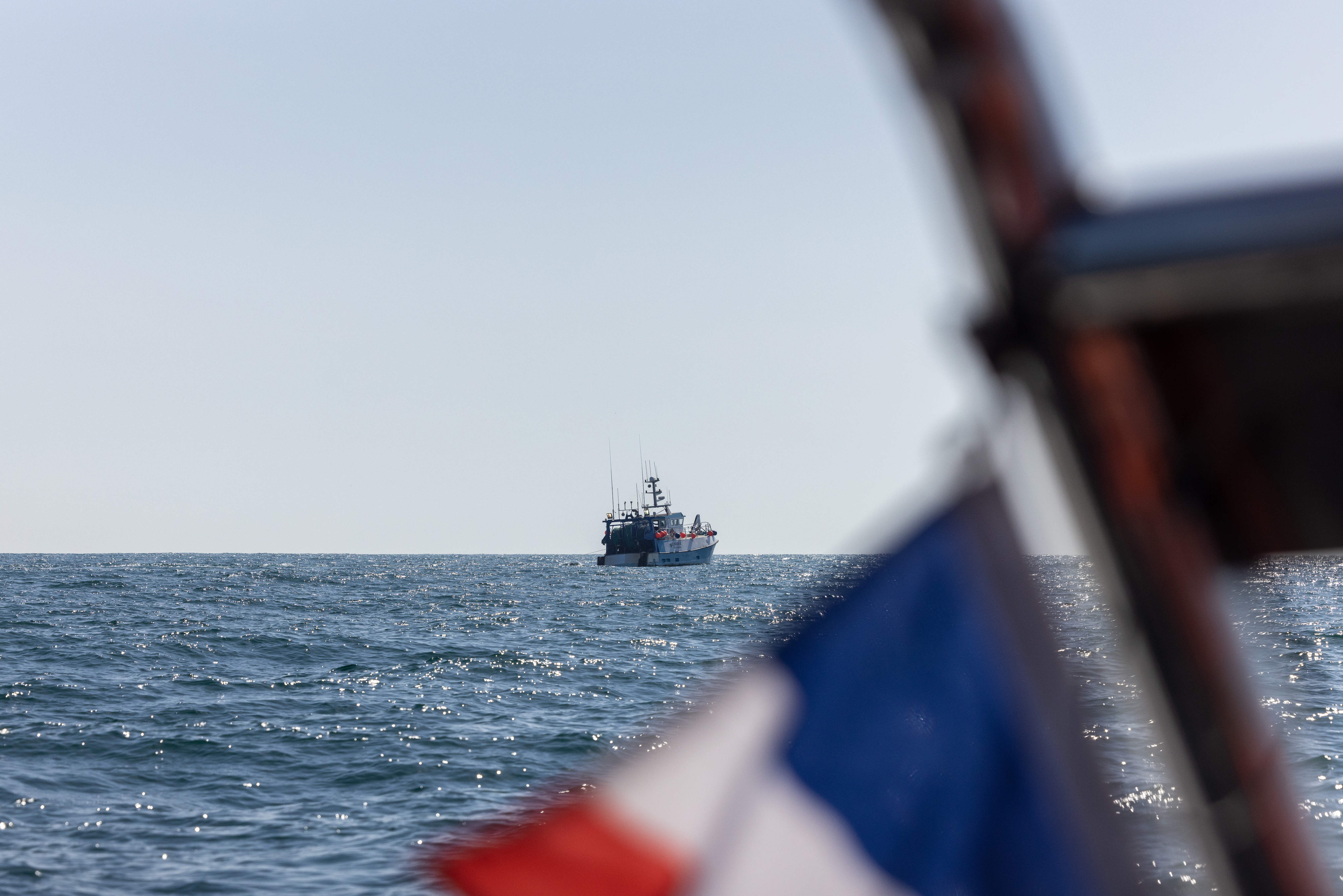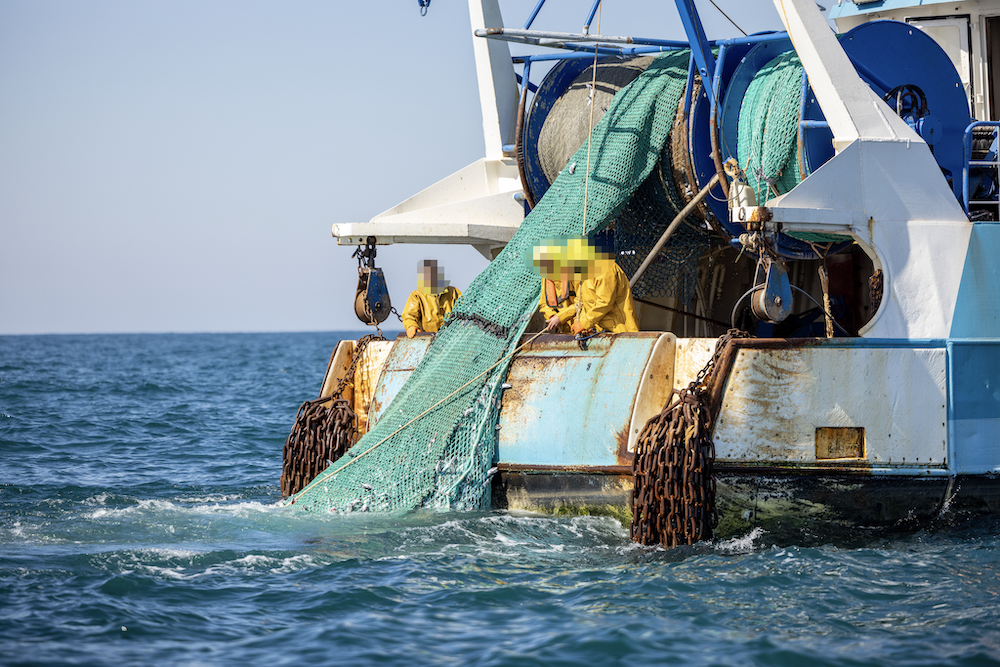
EU faces legal complaint as France, Germany, Italy leave ‘protected’ marine areas open to destruction
Legal action comes as countries take part in the global Our Ocean conference
France, Germany and Italy are seriously and systemically failing to protect vulnerable marine ecosystems in violation of EU law, according to a legal complaint filed today with the European Commission. The NGOs behind the complaint, the Environmental Justice Foundation (EJF), Blue Marine Foundation, ClientEarth, Défense des Milieux Aquatiques (DMA) and Deutsche Umwelthilfe e.V., are calling for the European Commission to launch infringement procedures and refer the issue to the European Court of Justice.
EU environmental laws, including the Habitats Directive, are meant to protect marine life, but in practice, it’s a different story. Across Europe, governments are still allowing destructive fishing in marine protected areas (MPAs), in particular bottom trawling, which indiscriminately scrapes the seabeds and devastates fragile marine habitats. The scale of the problem is staggering with bottom trawling currently taking place in 77% of France’s, 85% of Germany’s, and 44% of Italy’s marine Natura 2000 sites, areas supposed to be safe havens for wildlife.
In their complaint, NGOs highlight widespread breaches of EU law, with Member States failing to stop harmful activities in MPAs. Multiple EU countries are already facing national legal action over continued bottom trawling, despite what lawyers say are clear legal obligations under the Habitats Directive and other EU laws.
“We urge the European Commission to act decisively and urgently: launch infringement procedures, enforce EU law, and make its Ocean Pact more than just words,” said Marie Colombier, Senior Ocean Campaigner at EJF. “These legal obligations are not optional. Failure to enforce them means wiping out ocean wildlife, the health of our ocean and the future of fishing communities across Europe.”
The joint complaint focuses on 15 marine Natura 2000 sites where extensive evidence shows bottom trawling continues unchecked on an industrial scale, damaging sensitive habitats such as reefs, seagrass beds, and sandbanks.
“Bottom trawling continues to damage the fragile ecosystem of the Wadden Sea in blatant disregard of the official protection status of the area. German authorities confirmed last year that bottom trawling is the greatest cause of damage to North Sea habitats - but take no action,” said Svane Bender, Head of Nature Conservation at Deutsche Umwelthilfe. “In the Baltic Sea, it has been a major factor in the collapse of commercial fish stocks and still hasn’t been stopped completely. This hampers the recovery prospects of both nature and local fisheries.”
“The law has been in place since 1992, yet 90% of marine protected habitats and species in France remain in poor condition due to a lack of implementation. It’s clear that existing measures are falling short. Authorities must take urgent, concrete action to halt the ongoing decline in biodiversity and fisheries productivity,” said Philippe Garcia, President of Défense des Milieux Aquatiques.
“It is high time to ensure our MPAs are given a real chance to recover. Bottom trawling is incompatible with existing law, we urgently need clarity and enforcement from the Italian authorities to support marine biodiversity but also help small-scale fishers benefit from the long-term recovery of vital habitats,” said Dr Giulia Bernardi, Senior Italy Projects Manager of Blue Marine Foundation.
ENDS
Notes to Editors
In Germany’s “NTP S-H Wattenmeer und angrenzende Küstengebiete”, over 32,800 hours of bottom trawling were recorded annually over protected habitats between 2020 and 2024, including protected sandbanks. In France’s “Baie de Seine Occidentale”, 9,016 hours of trawling took place on protected habitats, including 8,793 on sandbanks. Meanwhile, in Italy’s “Tutela del Tursiops truncatus”, 11,923 hours were recorded annually in a site meant to protect seafloor habitats and marine species.
The complaint submitted to the European Commission calls for the proper implementation of the Habitats Directive, specifically through the regulation of bottom trawling in EU Marine Protected Areas (Natura 2000 sites). The NGOs argue that this fishing practice threatens protected seabed habitats and species, in violation of both national and European Union (EU) law.
The complaint provides evidence of legal failures in the implementation of Articles 6(1), 6(2), and 6(3) of the Habitats Directive.
While the complaint highlights 15 sites, the problem is far broader: bottom trawling occurs in 77% of France’s, 85% of Germany’s, and 44% of Italy’s marine Natura 2000 sites, with more than 1.7 million hours recorded annually across EU marine protected areas. 79% of the coastal seabed in EU waters is physically disturbed, primarily due to bottom trawling, and a quarter of the EU’s coastal area has likely lost functional seabed habitats.
With input and support from the partner NGOs involved in the complaint, EJF conducted the analysis of fishing pressure using Global Fishing Watch data (2020–2024), carrying out spatial processing in QGIS and completing final calculations in R Studio.
The complaint supports the goals of the EU Biodiversity Strategy for 2030 and the Kunming-Montreal Global Biodiversity Framework, which aim to protect 30% of EU seas by 2030. It also seeks to bring France, Germany, and Italy in line with the EU’s Marine Action Plan, which calls on Member States to ban mobile bottom fishing in all Natura 2000 sites protecting the seabed by March 2024, and to phase it out entirely in all MPAs by 2030.
The European Commission must respond within one year of receiving the complaint. At their discretion, they may decide to start an infringement procedure against the EU country concerned or close the complaint definitively. This complaint follows previous legal action by EJF and DMA against the French government for allowing bottom trawling in its MPAs initiated in February 2025 with the Huglo Lepage Law Firm, as well as similar legal actions from ClientEarth in Germany, the Netherlands, and Spain.
This complaint was developed thanks to the support of Huglo Lepage law firm and to the additional pro bono support facilitated by TrustLaw, the Thomson Reuters Foundation’s global pro bono legal network, undertaken by the following law firms across Europe: Hogan Lovells, Squire Patton Boggs LLP, and others who have chosen to remain anonymous.
About Environmental Justice Foundation (EJF)
Our work to secure environmental justice aims to protect our global climate, ocean, forests, wetlands, wildlife and defend the fundamental human right to a secure natural environment, recognising that all other rights are contingent on this. EJF works internationally to inform policy and drive systemic, durable reforms to protect our environment and defend human rights. We investigate and expose abuses and support environmental defenders, Indigenous peoples, communities, and independent journalists on the frontlines of environmental injustice. Our campaigns aim to secure peaceful, equitable and sustainable futures. Our investigators, researchers, filmmakers, and campaigners work with grassroots partners and environmental defenders across the globe. For more information, please contact media@ejfoundation.org.
About Défense des Milieux Aquatiques (DMA)
DMA’s primary focus is to take legal action before French administrative courts to reduce pressures on aquatic environments. We fight in particular against the overexploitation of these ecosystems, for instance regarding migratory fish (salmon, shad, lamprey, eel), bottom trawling, the diversion of watercourses, or migratory birds. DMA has succeeded in shortening the bottom trawling season in the three-mile zone of Arcachon from 12 to 5 months, and later in excluding this fishing technique from marine protected areas along these shores. It is essential to build on this momentum to safeguard all marine protected areas, but also the entire three-mile zone. Our major project is to free this zone from all non-selective fishing gear, that is, from all nets. This is the ‘Golden Miles’ project, which has already been a reality for decades in the USA and other countries. For more information, please contact: maigre42@gmail.com.
About Blue Marine Foundation
Blue Marine Foundation is a UK ocean conservation charity set up in 2010 by some of the team behind the award-winning documentary film ‘The End of the Line’. Blue Marine is dedicated to addressing overfishing, one of the world’s biggest environmental problems and aims to restore life in the ocean by protecting marine environments. Its mission is to ensure the effective protection of at least 30 percent of the ocean by 2030 and the sustainable management of the whole ocean. For more information, please contact media@bluemarinefoundation.com
About Deutsche Umwelthilfe e.V (DUH)/Environmental Action Germany
Environmental Action Germany is an independent non-profit association founded in 1975, entitled to bring legal action and campaigning mainly on a national and European level. The organisation supports all sustainable ways of life and economic systems that respect ecological boundaries. At the same time, the organisation fights for the preservation of biological diversity and the protection of natural assets as well as for climate protection. Our marine team is dedicated to protecting ocean health by addressing overfishing, promoting nature-friendly offshore wind development, and advancing sustainable marine spatial planning. We work for healthy seas in Germany and in close partnership with our European allies. For more information please contact: presse@duh.de
About ClientEarth
ClientEarth is a non-profit organisation that uses the law to create systemic change that protects the Earth for – and with – its inhabitants. We are tackling climate change, protecting nature and stopping pollution, with partners and citizens around the globe. We hold industry and governments to account, and defend everyone’s right to a healthy world. From our offices in Europe, Asia and the USA we shape, implement and enforce the law, to build a future for our planet in which people and nature can thrive together.
About Huglo Lepage Law firm
HLA supports associations, companies and local authorities in preserving natural habitats and protecting endangered species. Our expertise covers environmental authorizations, biodiversity preservation regulations such as protected species exemptions and Natura 2000 areas, as well as biodiversity action plans. We also advise our clients on the sustainable management of natural resources (water, air, soil), ensuring regulatory compliance and proposing solutions for sustainable development. For more information, please contact: raphaelle.jeannel@huglo-lepage.com
SIGN UP FOR OUR EMAILS AND STAY UP TO DATE WITH EJF

